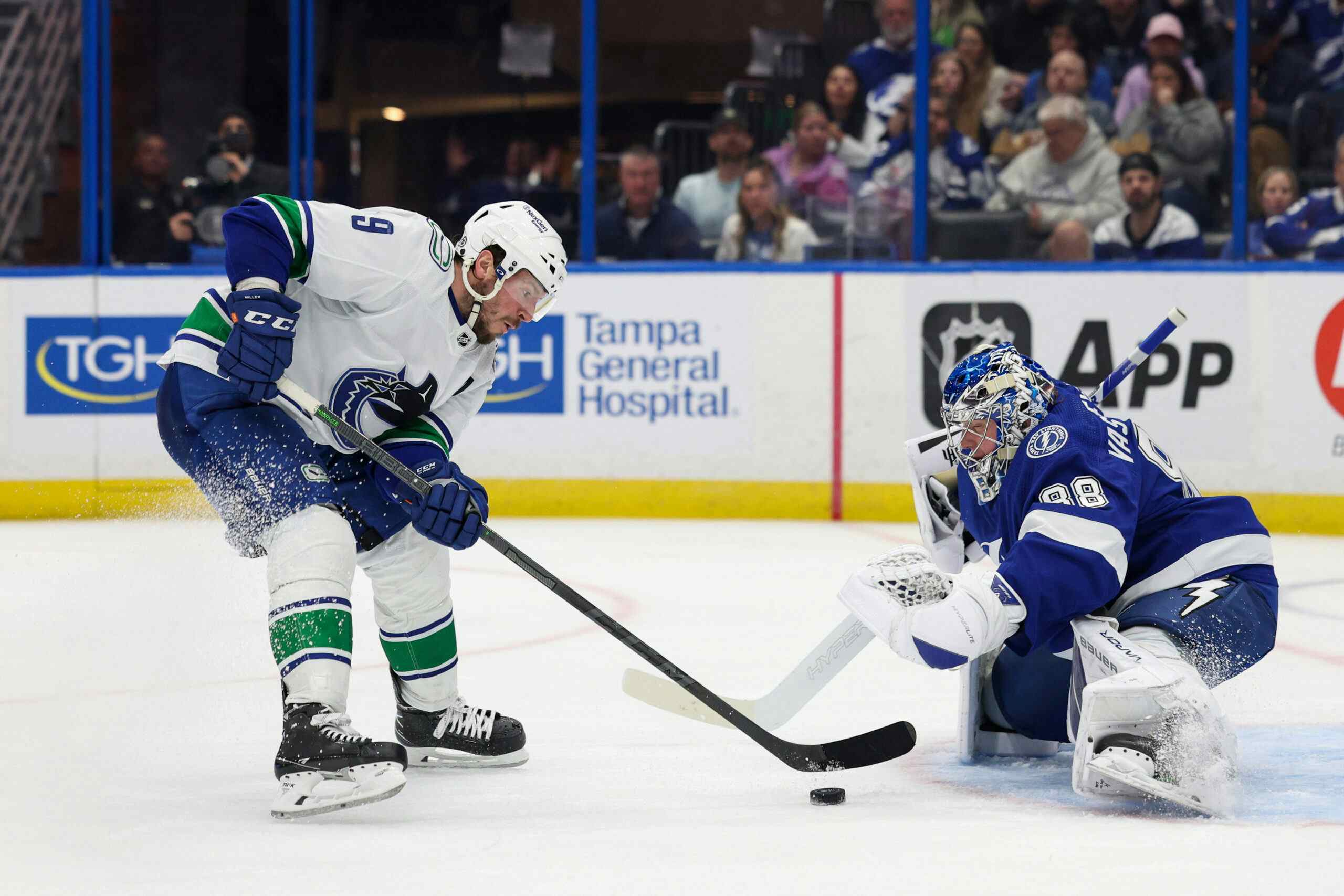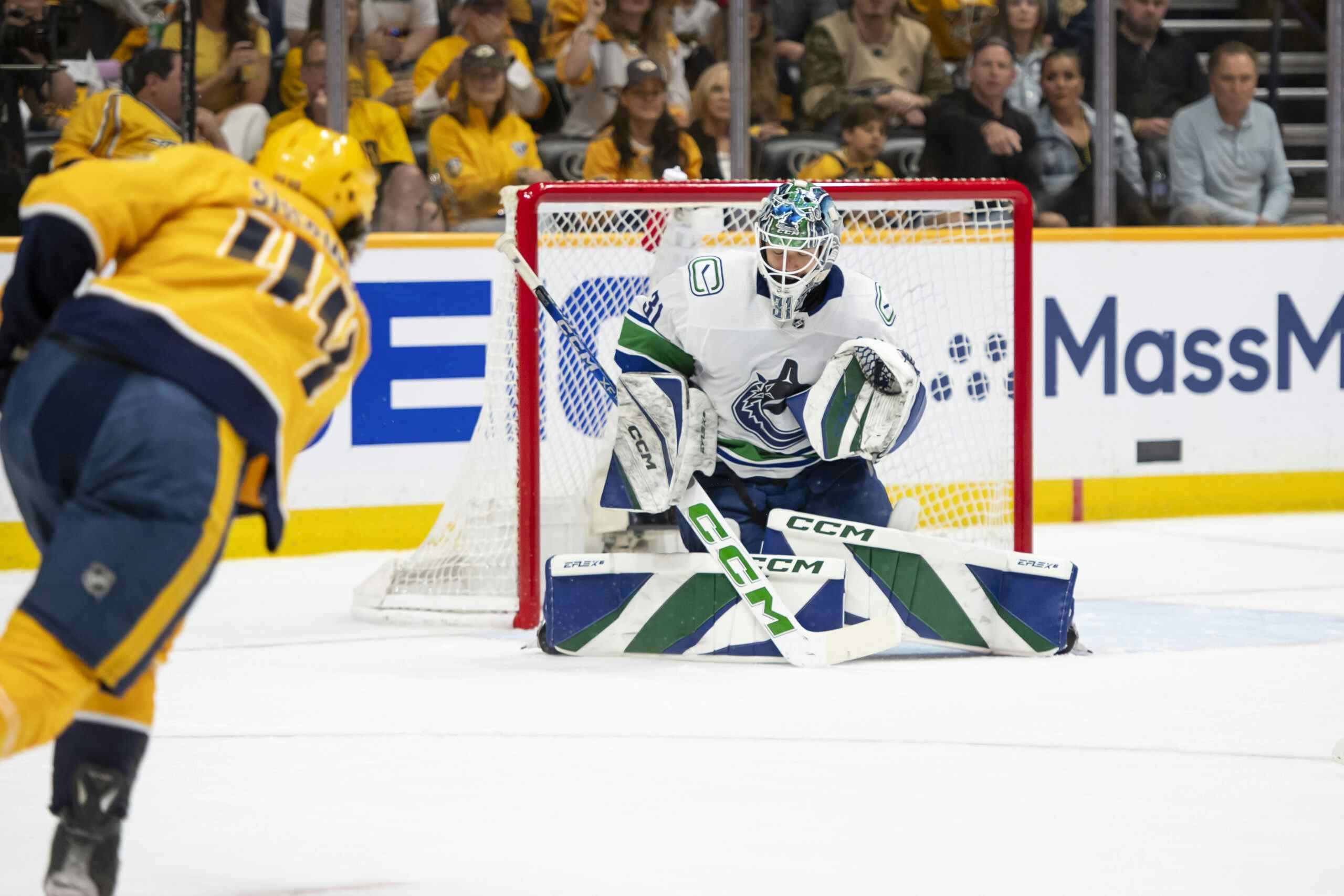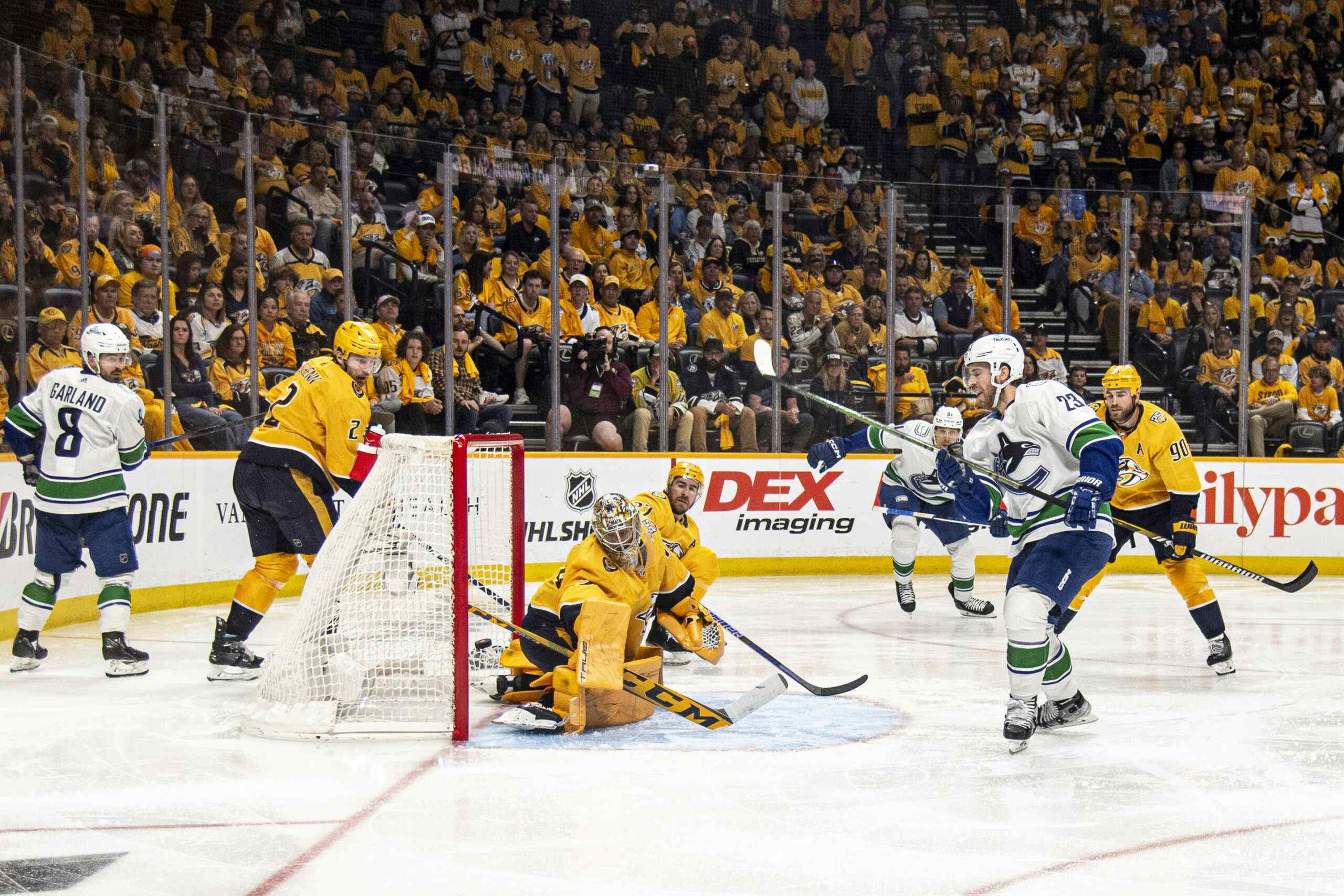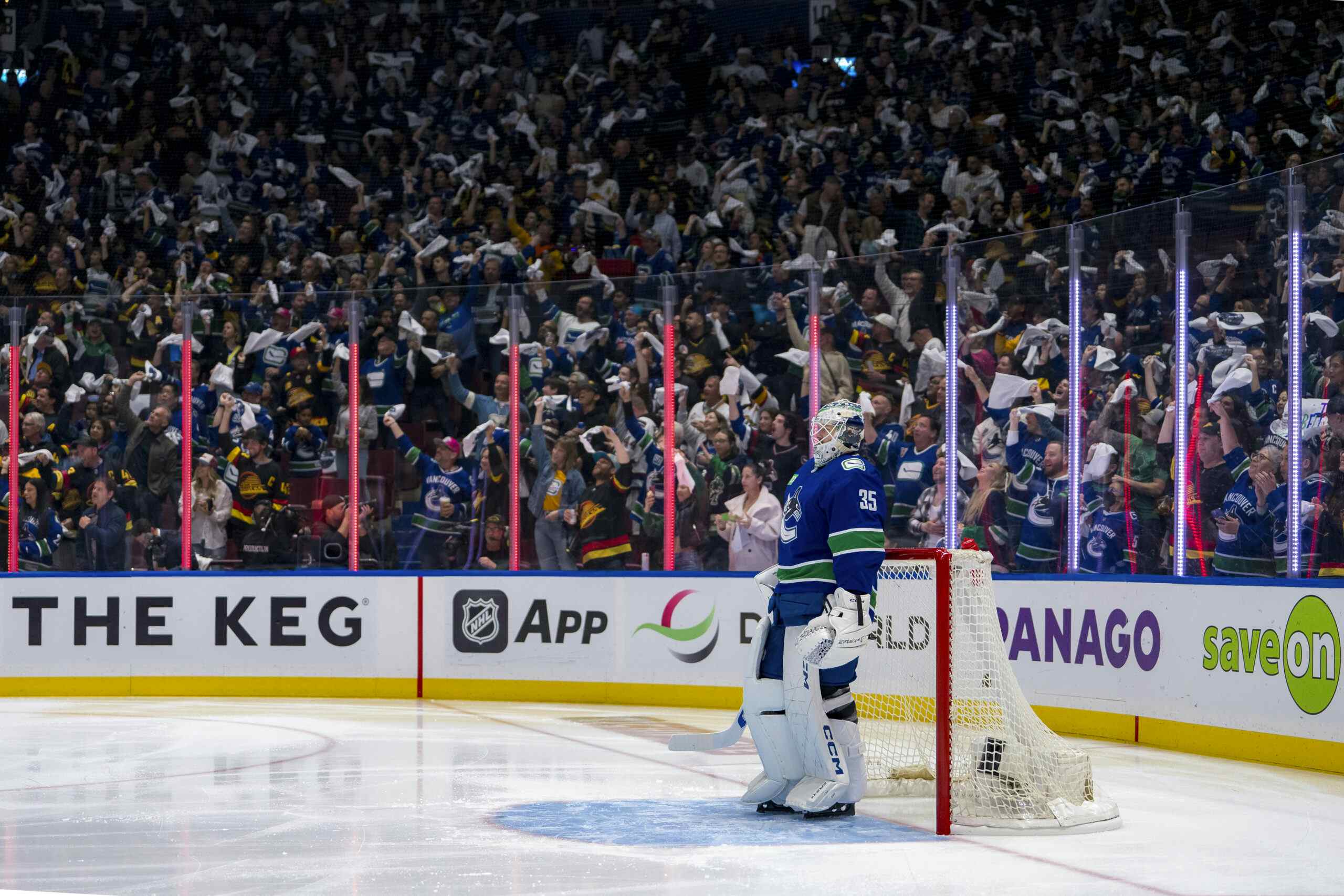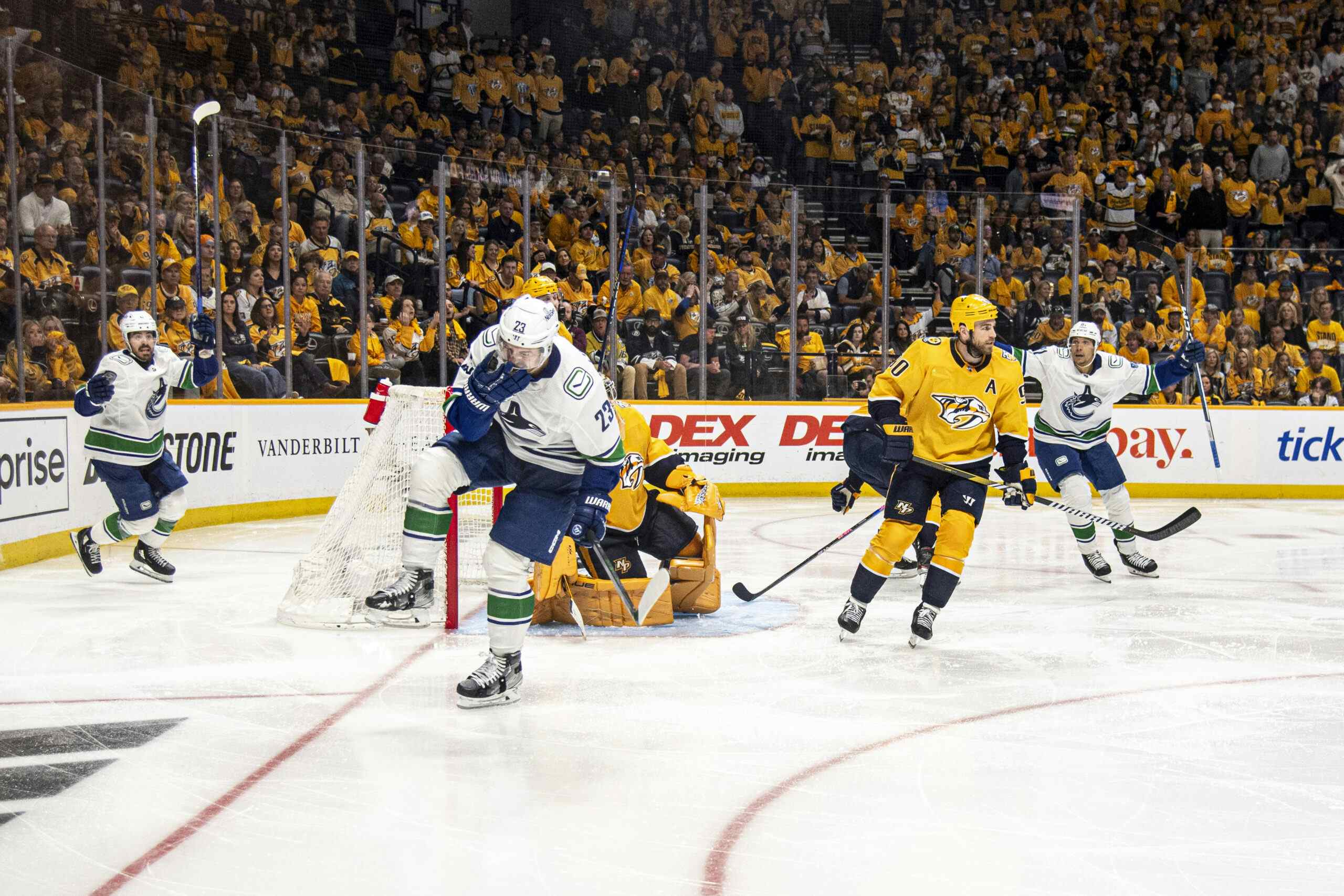Jason Garrison’s Rise from Obscurity
By Jeff Angus
11 years ago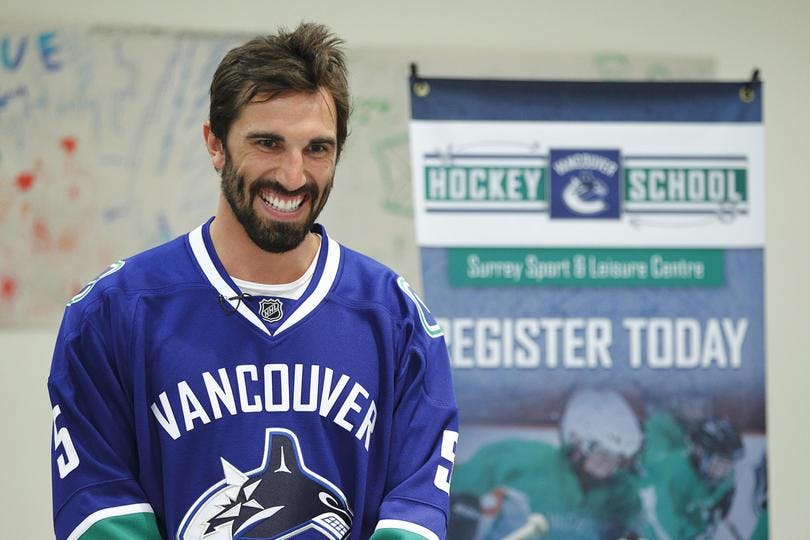
It isn’t often that a forward playing Junior B hockey at the age of 17 develops into a top four NHL defenseman. Don’t tell that to Jason Garrison, though. Most hockey fans had little idea who he was before the 2011-12 season, unless they were a fan of the Florida Panthers or happened to stumble upon James Mirtle’s 2011 column on the top defensive defensemen around the league.
Scoring 16 goals in 2011-12 changed all of that. Garrison was one of the most sought after UFAs this past summer. He rose from relative obscurity to sign a six-year deal worth $4.6 million per season in a little over two years. How, exactly, did he do it?
Read on past the jump to find out.
Garrison’s offensive explosion in 2011-12 was due in large part to Florida’s coach, Kevin Dineen, and his defensive partner this past season, Brian Campbell. Dineen had Garrison paired with Mike Weaver in 2010-11, and they were among the best "shutdown" defensive pairings in the entire league (in fact, they ranked as two and three on Mirtle’s list of the top defensive defensemen, trailing only Vancouver’s Dan Hamhuis).
Dineen had a hunch that Garrison had more to give offensively, however. The reason wasn’t his passing, vision, or skating (all of which are above average). Garrison can absolutely hammer the puck, and he knows how to get himself open. He and Campbell were a perfect fit on Florida’s top pairing. Garrison’s steady defense and booming slap shot meshed with Campbell’s sublime skating and passing.
Garrison was freed up from some of his defensive responsibilities, and he flourished offensively. His 16 goals trailed only Erik Karlsson and Shea Weber among NHL defensemen.
The Panthers wanted him back, but they didn’t appear willing to give him a long term deal (reports say that Florida offered Garrison $4 million per over two or three years). The Canucks on the other hand, were among the teams interested in getting Garrison’s name on a contract. He expressed a desire to play close to his White Rock home, and was willing to leave a fair bit of cash on the table and the rest is history. Garrison earned the massive contract with his offensive exploits, but the Canucks aren’t paying him to score 16 goals again (although that would be nice). What they want is a steady and reliable defensive defenseman who can contribute on the power play.
He’ll basically be Sami Salo’s replacement.

Garrison’s journey is an interesting one. He was still playing forward at the beginning of his junior hockey career, and was undrafted out of college. The Florida Panthers signed him in 2009, and he spent time developing with their AHL affiliate in Rochester. In 2010 he signed a two-year, one-way contract (meaning he would earn the same salary at the NHL or AHL level). He earned a roster spot out of camp that year, and quickly emerged as one of Florida’s best defensemen.
The Canucks hope that the 27-year-old late bloomer still has room to grow.
Behind the Curve
Garrison always seemed a year or two behind his peers throughout junior hockey. He struggled to make the local Triple A rep teams. At the age of 18, he was playing Junior B for the Richmond Sockeyes. At 18, most prospects are drafted (or on their way to being drafted), and playing in college or the CHL. Junior B is a long way away from either of those leagues.
Garrison had played forward for most of his hockey career, but in his first year of junior he was moved back to defense. He wasn’t a huge fan of the move at the time, but Garrison credits his coach with having the foresight to make the move.
“I had a coach my first year Junior that turned me into a defenseman ( I played forward my whole life) and it was probably one of the biggest reasons why I was able to get to where I am at.”
The next season, Garrison made the Nanaimo Clippers final roster. The Clippers play in the BCHL – the top Junior A league in the province. He spent two seasons with Nanaimo, and emerged as a quality prospect in his second season (2004-05), scoring 22 goals and adding 40 assists in 57 games. Garrison’s rapid development over those two years earned him a scholarship to the University of Minnesota-Duluth.
Many of Garrison’s 22 goals that season were of the slap shot variety. Garrison took pride in his shot, even from a young age.
"Growing up, I was complimented about my slap shot and really developed it in junior. It took a little bit of time to get the timing down for a one-timer and the accuracy, but for the most part, the strength of it has always been there."
At Minnesota-Duluth, Garrison played a top four role for the Bulldogs though he battled injuries (including a broken leg) during his tenure there. In his freshman season he played 40 games, but in his next two campaign he played in only dressed for a combined 47 games. After his junior season, the Florida Panthers signed him to a contract. At the age of 23, Garrison left school and joined the Panthers organization. Moving up from Junior B to the AHL in five years is pretty impressive, and even Garrison himself wasn’t convinced he was ever going to make it there.
Making it to the NHL is a long shot and while players climb the junior ranks, it`s hard to avoid the question, `what if I don`t make it?’ “I was a late bloomer and I honestly didn`t think I was going to make it as far as I have. That’s the reason I went to school.”
Garrison’s first season in pro hockey was a very successful one. In 78 games with the Rochester Americans, he scored eight goals and added 27 assists. The club wasn’t very good that season, compiling a 29-43-0-8 record, but Garrison was the highest scoring defenseman on the team (finishing with 15 more points than any other blue liner), and he was fourth on the team in scoring. He had his first taste of NHL action that year, playing one game up in Florida.
In 2009-10, Garrison split time between the Panthers (39 games) and the Americans (38 games). He posted a respectable eight points at the NHL level, especially considering he played only 20 seconds on the power play in each game. He saw over a minute per game on the penalty kill, and averaged 15:08 overall. After Florida’s season wrapped up, Garrison went back down to the AHL and put up nine points in Rochester’s first round playoff series with Abbotsford (ending in a Game 7 loss).
Garrison was one of the best Rochester players in 2009-10. Let’s Go Amerks, a blog covering the team, gave a review for each player on the roster upon the conclusion of the season.
“He’ll have a full time job in the NHL soon enough. The defense had issues all season and without Garrison in the lineup for the postseason things may have been [even worse]. Once he masters his shot from the point and can use it more effectively he’ll have a long career ahead of him.”
A bit of foreshadowing with that last point. Florida liked enough of what they saw from Garrison that season to reward him with a two-year, one-way contract extension. He came in to camp with a lot of confidence, and it showed in his play.
Finally a Panther
The one-way contract gave Garrison some level of comfort as the 2010-11 season approached.
"You sign that 1-way contract and you know that management has confidence in you that you’re able to stay. So for me I just wanted to make sure I showed them that they made the right decision and work hard on and off the ice and try to learn as much as I could [and] limit my mistakes and just progress and develop as a player."
Garrison was one of the most effective defensemen in the league, forming an unlikely shutdown pairing with the undersized Mike Weaver. Garrison and Weaver – a former Canucks cast-off and one of the most underrated defensive defenseman in the NHL – played some of the most difficult minutes in the league, started the bulk of the team in the defensive zone, and came out ahead in goals and possession.
The Panthers moved Garrison up to the top pairing in 2011-12 alongside the dynamic Brian Campbell. The shutdown role was now on the shoulders of Weaver and Dmitri Kulikov. Garrison had been a productive offensive defenseman in the past, mostly because of his hard and accurate one-timer. The move paid off, as Garrison scored 16 goals, good enough for third among NHL defensemen.
Garrison’s changing role:

Campbell was the catalyst in Garrison’s breakout campaign. Garrison saw more power play time as well, and his penalty killing responsibilities were cut a bit, too. Even with his, impressive goal total, Garrison still wasn’t getting the respect he deserved around the league. One NHL team executive had the following to say about him:
“He’s a No. 5 defenceman. Plus, he’s only lit it up for one year. There’s no body of work here.”
The second part of that statement is true. In terms of being a productive defenseman at the NHL level, Garrison really only has one year to fall back on. However, the only team where he wouldn’t crack the top four would be an All-Star team.
You can count the number of defensemen who have been better than him in the defensive zone since 2010 on two hands. He likely won’t score 16 goals again, as the Canucks don’t have a playmaker like Campbell on the back end. However, Garrison’s value comes more from his ability to eat minutes and shut down opposing stars and less from his ability to light the lamp.
Garrison also led Florida’s defense in On-Ice Corsi, Relative Corsi, and plus/minus (I know, I know). You can see how Garrison’s role changed from 2010-11 to 2011-12:
This past summer, I spoke with Chris Roberts from Litterbox Cats, the SBNation blog covering the Florida Panthers. Here is the Q&A:
When did Garrison first emerge as a legitimate NHL defenseman?
As an undrafted player signed by then-GM Jacques Martin, Garrison was sent to the AHL the season after leaving Minnesota-Duluth. Though at the time no one in the media seemed to notice, that season with Rochester was what probably punched his NHL ticket. Next season he’d earn call up duty with the Panthers. At that point, internal changes and free agent departures left the Panthers with a bare-bones roster for 2010-11.In some ways Garrison’s name on the roster wasn’t due to his promise but rather that Florida was desperate for players, any player. Given a full season and good ice time with Mike Weaver, Garrison really began to show glimpses of his scoring power with five goals from the Panthers’ rarely offensive blueline. His shot was a factor, but it wasn’t until Dineen paired him with a truly offensive minded Brian Campbell that people started to take notice.
Were Florida fans confused when Dineen split him and Weaver up for the 2011-12 season?
Some of the confusion came from the fact that with all of the offseason changes a rookie coach would break up what seemed to be the only constant on the team; that Garrison-Weaver pairing. Looking back now the decision worked out just fine. Garrison had already learned the finer points of defensive hockey from Weaver and was given a complimentary partner to set him up for almost all of his 16 goals. The shutdown pairing would be reunited on the penalty kill, so it wasn’t a total goodbye.
The Canucks are hoping for 15+ goals again, but I think they know not to expect it. How good is Garrison defensively? Is he someone the Panthers leaned on against the very best in the East?
While the experts focused on his scoring and possible decline in scoring without Campbell, it was frustrating for to see how little his defensive game was covered during free agency. Garrison is as stable as defensemen come and eats big minutes on the penalty kill; he’s not a one trick pony with a big shot. Garrison was given big money because of his offense, but he got into the league because of his defensive play.
What are his strengths and weaknesses?
His main strength is obviously scoring, but it’s not all from a booming shot. A good percentage of Garrison’s goals came from putting himself in the right place at the right time. He knows how to capitalize by moving his feet. And though Florida’s penalty killing percentage dropped from last season, he’s still a top pairing penalty killer and physical player.As far as genuine weaknesses, he was rarely a player who’d make you shake your head after a dumb play. Garrison could seemingly do it all without making mistakes. The only concern after last season is whether he can create his own offense or if he needs a set-up man to be successful. My guess is his scoring will drop a bit without Campbell and top pairing ice time.Garrison is nothing if not a success story; if you’d have told me in 2010 he’d score 21 goals and 30 assists over the next two seasons I’d have laughed. Garrison was a well liked player amongst fans and never created trouble in the locker room. Even though he left Florida, I think most fans know better than to be bitter when a well behaved player leaves for big money and a lengthy contract in his hometown after playing several seasons near the league minimum salary. You’d be hard pressed to find anyone who doesn’t wish Garrison success in Vancouver.
How Garrison fits in with the Canucks remains to be seen. Canucks Army has a lot of Garrison-related coverage from this past summer.
Recent articles from Jeff Angus

